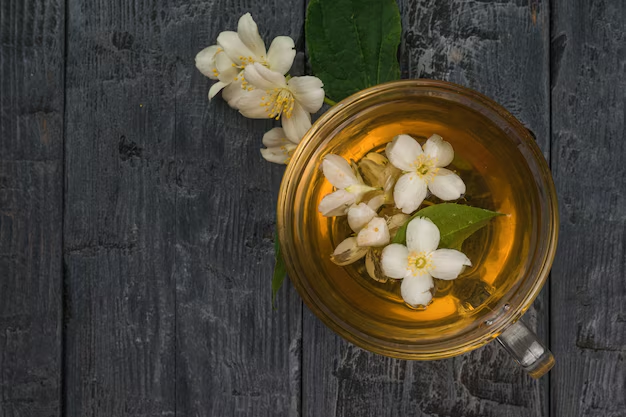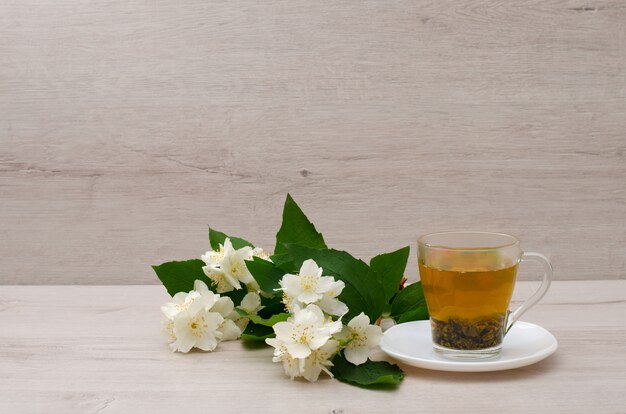Jasmine tea has gained immense popularity among tea enthusiasts for its delightful aroma and unique taste. But does jasmine tea have caffeine? This is a crucial question for health-conscious consumers looking to balance their caffeine intake.
Understanding the caffeine content in jasmine tea is essential, as it combines the natural fragrance of jasmine flowers with tea bases like green, white, or black tea. Let’s dive deeper to uncover the facts.
What is Jasmine Tea?
Jasmine tea originated in China over 1,000 years ago during the Song Dynasty. Its refreshing floral aroma made it a favorite among royalty and tea lovers alike. Over time, it became a staple in traditional Chinese tea culture and spread across the globe.
How Is Jasmine Tea Made?
Jasmine tea is created by blending jasmine flowers with a base tea, usually green, white, or black. Fresh jasmine flowers are layered with tea leaves during processing. The tea absorbs the natural oils from the flowers, infusing it with their sweet fragrance.
- Green Tea Base: Most common; offers a balanced, mildly grassy flavor.
- White Tea Base: Delicate and subtly floral, for those who prefer lighter teas.
- Black Tea Base: Bold and robust, complementing the rich jasmine scent.
Types of Jasmine Tea
The type of base tea determines the flavor and caffeine content. Common types include:
- Jasmine green tea (most popular).
- Jasmine white tea (milder option).
- Jasmine black tea (stronger and more caffeinated).
Each variety caters to different taste preferences and caffeine needs.
Does Jasmine Tea Have Caffeine?
Yes, jasmine tea does contain caffeine. Its caffeine content comes from the tea leaves used as the base. Since jasmine flowers themselves are caffeine-free, the caffeine levels depend entirely on whether the base is green, white, or black tea.
- Green Tea Base: Moderate caffeine levels.
- White Tea Base: Lower caffeine content.
- Black Tea Base: Highest caffeine levels among the three.
Comparatively, jasmine tea’s caffeine content is lower than coffee but varies significantly depending on its preparation and the type of base used. If you’re comparing “caffeine in jasmine tea vs green tea,” the two are quite similar, as most jasmine teas use green tea as a base.
How Much Caffeine is in Jasmine Tea?

On average, a cup of jasmine tea contains between 15 to 60 milligrams of caffeine, depending on the base tea. Here’s how it compares:
| Type of Drink | Caffeine per 8oz (mg) |
| Jasmine Green Tea | 20-40 |
| Jasmine White Tea | 15-30 |
| Jasmine Black Tea | 40-60 |
| Regular Coffee | 90-120 |
Factors Influencing Caffeine Content
- Type of Base Tea: Green tea has moderate caffeine; black tea has more.
- Steeping Time: Longer steeping extracts more caffeine.
- Water Temperature: Hotter water releases more caffeine.
- Tea Leaf Quality: High-grade loose-leaf tea often has slightly more caffeine than tea bags.
For example, steeping jasmine green tea for 2 minutes will yield lower caffeine levels compared to steeping black tea for 5 minutes.
Is Jasmine Tea a Good Choice for Low-Caffeine Drinkers?
Jasmine tea is an excellent choice for those who want a gentle energy boost without the jitters associated with coffee. It’s perfect for:
- Individuals seeking a balanced caffeine intake.
- People sensitive to high caffeine but not entirely caffeine-free drinks.
- Those looking for a midday pick-me-up without disrupting their sleep cycle.
Is Jasmine Tea Good for Sleep?
Jasmine tea, particularly with a green or white tea base, is considered a soothing option for the evening. While it does contain caffeine, its calming aroma can promote relaxation. However, if you’re highly sensitive to caffeine, you might want to switch to herbal or decaffeinated teas before bed.
Caffeine-Free Alternatives
For completely caffeine-free options, consider:
- Herbal teas like chamomile or rooibos.
- Decaffeinated jasmine tea, which retains its floral essence but has almost no caffeine.
Caffeine Comparison With Other Teas
When comparing jasmine tea to other teas, caffeine levels vary significantly based on the type of tea used as a base. Here’s how jasmine tea stacks up against popular teas:
Jasmine Tea vs Green Tea
Jasmine tea often uses green tea as its base, so its caffeine levels are similar, around 20-40 mg per cup. However, jasmine tea’s floral aroma can make it feel lighter and less stimulating than plain green tea.
Jasmine Tea vs Black Tea
Black tea, known for its bold flavor, contains more caffeine than jasmine tea—roughly 40-90 mg per cup. Jasmine tea with a black tea base sits on the higher end of caffeine levels among jasmine varieties.
Jasmine Tea vs White Tea
White tea has the least caffeine of all tea bases, around 15-30 mg per cup. Jasmine tea with a white tea base is ideal for those seeking a mild caffeine intake with a delicate floral note.
Jasmine Tea vs Herbal Teas
Herbal teas like chamomile or peppermint are naturally caffeine-free, making them excellent alternatives for evening relaxation. When comparing “jasmine tea vs chamomile caffeine,” chamomile wins for those avoiding caffeine entirely.
| Tea Type | Caffeine Content (mg per 8oz) |
| Jasmine Green Tea | 20-40 |
| Jasmine Black Tea | 40-60 |
| Jasmine White Tea | 15-30 |
| Regular Black Tea | 40-90 |
| Herbal Teas (e.g., Chamomile) | 0 |
Understanding these differences helps tea drinkers choose based on their caffeine tolerance and preferences.
Benefits of Jasmine Tea (Beyond Caffeine)
Jasmine tea offers more than just a moderate caffeine boost. Its health benefits make it a popular choice among tea enthusiasts. Let’s explore its key advantages:
Rich in Antioxidants
Jasmine tea, particularly with green or white tea bases, is packed with polyphenols like catechins. These antioxidants combat free radicals, reducing oxidative stress and promoting overall health. Antioxidants in jasmine tea also support heart health and may reduce the risk of chronic diseases.
Aids in Stress Relief
The floral aroma of jasmine tea has a natural calming effect. It can help reduce anxiety and improve mood. Drinking a warm cup of jasmine tea can be a soothing ritual that encourages relaxation after a long day.
Supports Digestive Health
Compounds in jasmine tea may aid digestion and support gut health. It’s gentle on the stomach, making it suitable for those with mild digestive concerns.
Boosts Immunity
Jasmine tea contains immune-boosting properties thanks to its antioxidants. It helps the body fend off illnesses and maintain better health overall.
Secondary Benefits
- Weight Management: Green tea-based jasmine tea may enhance metabolism and help in weight loss.
- Skin Health: Antioxidants promote healthier, glowing skin.
- Relaxation for Sleep: While not entirely caffeine-free, jasmine tea can encourage relaxation in the evening.
Incorporating jasmine tea into your routine can offer a variety of benefits for both mind and body.
Side Effects of Jasmine Tea
While jasmine tea is generally safe, there are some potential downsides to consider, especially for those sensitive to caffeine or prone to overconsumption.

Caffeine Sensitivity
Jasmine tea contains moderate amounts of caffeine. For individuals sensitive to caffeine, drinking too much can lead to:
- Insomnia or disrupted sleep patterns.
- Nervousness or jitteriness.
- Increased heart rate in extreme cases.
Is Jasmine Tea Safe During Pregnancy?
Pregnant women can enjoy jasmine tea in moderation but should be cautious about caffeine intake. Excess caffeine during pregnancy may increase the risk of complications. Consulting a doctor is always recommended.
Overconsumption Risks
Drinking large quantities of jasmine tea can lead to:
- Dehydration due to its diuretic properties.
- Acid reflux, especially when consumed on an empty stomach.
Tips for Safe Consumption
- Limit to 2-3 cups per day if you’re sensitive to caffeine.
- Opt for decaffeinated jasmine tea if needed.
While jasmine tea offers numerous health benefits, moderation is key to avoiding side effects.
To Read: Does Sweet Tea Have Caffeine?
FAQs
Does jasmine tea keep you awake?
Yes, jasmine tea can keep you awake due to its caffeine content. However, the effect is milder compared to coffee. Opt for white tea-based jasmine tea or decaffeinated versions for evening use.
Can you drink jasmine tea while pregnant?
Yes, but only in moderation. Pregnant women should limit caffeine intake to under 200 mg daily. One or two cups of jasmine tea per day is generally safe, but consulting a doctor is advised.
Is jasmine tea good for stress relief?
Yes, the calming aroma of jasmine tea can help reduce stress and anxiety. Despite its caffeine, the tea’s relaxing properties make it a popular choice for stress relief.
What are caffeine-free jasmine tea options?
Decaffeinated jasmine tea is an excellent option for those avoiding caffeine. Alternatively, herbal teas like chamomile mimic the soothing effect of jasmine without caffeine.
Is jasmine tea better than coffee for energy?
Jasmine tea provides a gentler energy boost compared to coffee. Its moderate caffeine content energizes without causing jitters, making it a good option for those seeking balance.
Conclusion
Jasmine tea is a delightful beverage with moderate caffeine levels, offering a perfect middle ground for tea lovers. Its caffeine content depends on the tea base, allowing you to choose the variety that best suits your needs. Beyond caffeine, jasmine tea’s antioxidants and calming aroma offer a range of health benefits.
For those sensitive to caffeine, decaffeinated or herbal options provide similar relaxation without stimulating effects. Whether you’re sipping for energy, health, or relaxation, jasmine tea is a versatile choice for every lifestyle.

